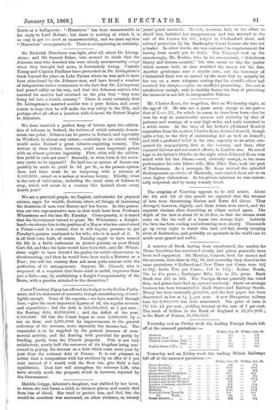Count rambray Digny has offered his budget to the Italian
Parlia- ment, and his statement of accounts, though unsatisfactory, is intel- ligible enough. None of the reports,—we have searched through four,—give the most important figures of all, the regular revenue and expenditure ; but the debt is 250,000,0001. at 5 per cent. ; the floating debt, 40,000,000/. ; and the deficit of the year, 9,000,000/. Of this the Count hopes to cure 3,000,0001. by a tax on flour, and 3,000,0001. by improvements in the general collection of the revenue, more especially the income-tax. The remainder is to be supplied by the general increase of com- mercial activity, and the floating debt provided for partly by funding, partly from the Church property. This is not very satisfactory, nearly half the resources of the kingdom being con- sumed in paying the interest on a debt which costs more year by year than the national debt of France. It is not pleasant to notice that a composition with her creditors by an offer of 3 per cent. instead of 5 would, with the flour tax, give Italy a real equilibrium. That fact will strengthen the extreme Left, who have already made the proposal, which is, however, rejected by the Government.






























 Previous page
Previous page